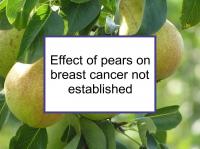Like apples, pears (Pyrus communis) are a member of the Rosaceae family. Pears are a good source of dietary fiber. Pears also contain some chlorogenic acid, oleanolic acid, phloretin, ursolic acid (in pear skin), vitamin C and vitamin K. While these compounds are beneficial, pears have low chemopreventive activities compared to many other fruits.
Most of the beneficial compounds found in pears are concentrated in the skins. Pears may reduce the risk of stroke and have cholesterol-lowering activities, in addition to improving insulin resistance.
Cancer-related effects of eating pears
Consumption of pears has been found to be associated with lower risks head and neck, esophageal, lung, gastric and colorectal cancer in epidemiological studies. One small Swiss population study found that consumption of pears was associated with lower risk of breast cancer. However, pears contain only modest levels of micronutrients that have been linked to lower breast cancer risk compared to apples and many other fruits.
Additional comments
As noted above, pear skins contain far more biologically active compounds than the flesh. However, non-organic pears must be washed very thoroughly to remove pesticide residue as much as possible.
Prickly pears or cactus pears are a type of cactus unrelated to pears.
Below are links to recent studies concerning this food and its components. For a more complete list of studies, please click on pear.
